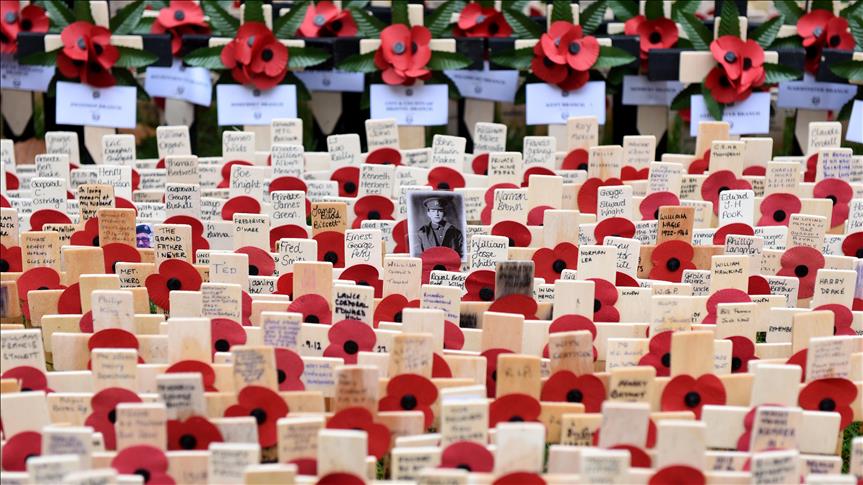 ( Kate Green - Anadolu Agency )
( Kate Green - Anadolu Agency )
By Michael Sercan Daventry
LONDON
On what will likely be a dark and cold Friday evening, the two oldest teams in international soccer will step onto the turf of London’s Wembley Stadium and deliberately break the laws of football.
The game between England and Scotland, officiated by Turkish referee Cuneyt Cakir, is scheduled to be a standard qualifier match for the 2018 World Cup between two neighboring countries.
But, baited in part by the British press, players from both teams will play the game wearing black armbands with the emblem of a red poppy.
In doing so they will simultaneously defy FIFA -- the world governing body for football -- and demonstrate Britain’s curiously tempestuous bond to a flower that symbolizes wartime remembrance.
‘Heartless, cold-blooded’
The laws governing the game prohibit clothing that carries “any political, religious or personal slogans, statements or images” and can penalize teams with fines or points deductions for doing so.
But British tabloids have denounced FIFA chiefs for what it termed a “heartless” and “cold-blooded” approach to the match on Nov. 11, the 98th anniversary of the end of the First World War.
“Wearing a poppy is not a political statement. It’s a harmless and poignant way to remember Britain’s war dead,” The Sun, the country’s highest circulation daily newspaper, said in an editorial earlier this month.
“You can honour those who lost their lives without agreeing with all the wars they were sent to fight. Many do.
“It’s more political to refuse to do so because you object to those conflicts.”
The tabloid organized a petition signed by more than 300,000 people and enlisted the support of U.K. politicians including the Prime Minister, Theresa May.
The flower took its war connotations in the U.K. after the First World War, inspired by a 1915 poem – In Flanders Fields – that evoked the image of poppies as the first flowers to grow from the graves of soldiers who died fighting in Belgium.
Wartime symbol
Poppies are a symbol of remembrance in many countries that were once part of the British Empire, including Australia, Canada and New Zealand. But it is in the U.K. where they are most ubiquitous.
Each year millions of artificial poppies, made from paper with a green plastic stem, are sold by volunteers to raise money for the Royal British Legion, the charity for armed forces veterans.
For a country that generally has an uneasy relationship with symbols – the U.K. national flag, for example, is flown infrequently from public buildings and rarely displayed outside private homes – the poppy is a prolific exception.
If you stood on a busy central London street in early November and tried to count them on passers-by, you would quickly lose count.
Occasionally it has inspired huge works of art. In November 2014, the grounds surrounding the historic Tower of London castle were covered in 888,246 tiny ceramic poppies – each representing a British Empire soldier killed in the First World War. It helped visualize the vast numbers of servicemen who died between 1914 and 1918.
Staple of the lapel
Some wearers say the flower recognizes the sacrifice by members of Britain’s armed forces who died fighting for their country, even if they did not necessarily support the cause they were fighting for.
Television newsreaders, company chief executives and politicians are rarely seen without one affixed to their chests at this time of year.
But some say the poppy has lost its original meaning and effectively become compulsory uniform, with a hostile press pouncing each year on organizations who oppose them or personalities who simply choose not to wear one.
Prime Minister Theresa May even joined in this year’s target of anger, FIFA.
“I think the stance that has been taken by FIFA is utterly outrageous,” May told lawmakers in parliament last week.
“Our football players want to recognize and respect those who have given their lives for our safety and security.
“I think it is absolutely right that they should be able to do so.”
Journalist Robert Fisk said his father, who fought in the First World War, used to wear the poppy because it symbolized the great waste of humanity in the conflict.
FIFA disciplinary action
He gave up towards the end of his life when he realized it had lost its original meaning, Fisk wrote in a 2011 column in the Irish Independent: “Heaven be thanked the soldiers of the Great War cannot return today to discover how their sacrifice has been turned into a fashion appendage,” he said.
Earlier this week FIFA opened proceedings against the Republic of Ireland team for wearing a symbol on their kit commemorating the Easter Rising, a 1916 rebellion against British rule.
The move makes some form of disciplinary action more likely against the football associations of England and Scotland after their players wear the poppy at Friday’s match.
But English Football Association chief Martin Glenn, wearing a poppy in his lapel at an event in London on Thursday, said they would contest any ruling.
“We think they’re interpreting the rules wrongly,” he said, according to The Guardian.
He continued: “I'm very confident our legal position's right; our moral position's certainly right,” adding, “our case is absolutely rock solid.”
Anadolu Agency website contains only a portion of the news stories offered to subscribers in the AA News Broadcasting System (HAS), and in summarized form. Please contact us for subscription options.

